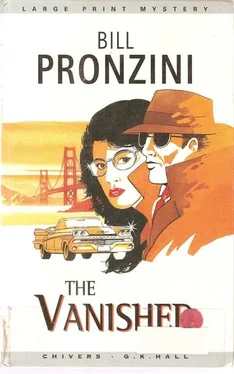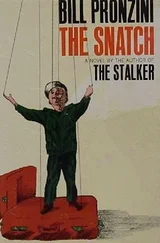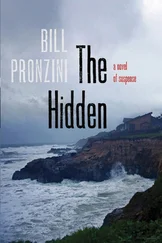Bill Pronzini - The Vanished
Здесь есть возможность читать онлайн «Bill Pronzini - The Vanished» весь текст электронной книги совершенно бесплатно (целиком полную версию без сокращений). В некоторых случаях можно слушать аудио, скачать через торрент в формате fb2 и присутствует краткое содержание. Жанр: Детектив, на английском языке. Описание произведения, (предисловие) а так же отзывы посетителей доступны на портале библиотеки ЛибКат.
- Название:The Vanished
- Автор:
- Жанр:
- Год:неизвестен
- ISBN:нет данных
- Рейтинг книги:3 / 5. Голосов: 1
-
Избранное:Добавить в избранное
- Отзывы:
-
Ваша оценка:
- 60
- 1
- 2
- 3
- 4
- 5
The Vanished: краткое содержание, описание и аннотация
Предлагаем к чтению аннотацию, описание, краткое содержание или предисловие (зависит от того, что написал сам автор книги «The Vanished»). Если вы не нашли необходимую информацию о книге — напишите в комментариях, мы постараемся отыскать её.
The Vanished — читать онлайн бесплатно полную книгу (весь текст) целиком
Ниже представлен текст книги, разбитый по страницам. Система сохранения места последней прочитанной страницы, позволяет с удобством читать онлайн бесплатно книгу «The Vanished», без необходимости каждый раз заново искать на чём Вы остановились. Поставьте закладку, и сможете в любой момент перейти на страницу, на которой закончили чтение.
Интервал:
Закладка:
When we got to the car and I had the engine warmed up, I said, ‘I’m ready to call it a night. You want me to drop you back to Larson?’
‘No, it’s too damned early. I’ll get out at the Bayerischer Hof.’
He directed me back there, in clipped sentences, and I put the Volkswagen away in their garage area. On the street in front I said, ‘I’ll let you know if I turn anything on Sands tomorrow-or if there’s anything else you might give me a hand on.’
‘Yeah, you do that,’ MacVeagh said, and he went away without looking at me again.
I watched him go, and then I coughed and spat phlegm into the street and entered the lobby, listening to the blood pound in my ears…
CHAPTER TWELVE
Blumenstrasse was a little cobblestoned street in a semi-residential area a few blocks from the Bayerischer Hof, and number fifteen was a dust-colored building with intricate wood-studding from sidewalk to peaked roof. A rounded arch gave on a short vestibule, and above the arc was a small sign lettered in pale blue: Galerie der Expressionisten.
I parked the Volkswagen across the narrow street and sat looking over there for a time. It was a few minutes past ten, and rain fell in a light, steady drizzle; but the sky to the west was ominous, the color of a dusty school blackboard, pregnant with heavy water. I felt cold and irritable. I still had the cough and the constriction in my chest, but I kept trying to convince myself they were psychosomatic; hadn’t the damned headache dissolved sometime during the night?
I pulled up the collar on my overcoat and got out and crossed the cobblestones. In the vestibule beyond the arch, a wood-and-glass-paned door let me into a small room with a parqueted wood floor, brightly lighted by ceiling fluorescents; a mellifluous bell above the door announced my entry. Directly across from me was another arch, with maroon curtains swept and tied like portieres at each jamb; beyond, there was another room, identical to the one in which I now stood.
The white-painted walls of both were filled with dozens of squares and rectangles and oblongs of various dimensions, some alive in vivid color, some brooding darkly-things imitative of Renoir and Monet and Degas; of German impressionists Kirchner, Beckmann, Nolde; of Surrealists such as Dali and Miró. There were also several new ideas and styles that defied categorizing, and no landscapes or seascapes or conventional portraiture. All of it was oil, and all of it original, and all of it-the good, the bad, and the ugly-done by amateurs or unrecognized professionals.
I was looking at a pyrotechnic study in diverse shades of blue, which had both a name and a meaning I did not understand, when a slender, distinguished-looking little man in a neatly trimmed Vandyke beard came through the curtained arch. He wore a dark suit and a multihued tie that might have been painted by one of the artists represented on the gallery walls; his eyes and his carefully brushed hair were the same slate-gray color.
‘Guten Morgen ,’ he said, and smiled.
‘Guten Morgen ,’ I answered. ‘Are you Herr Ackermann?’
‘Herr Norbert Ackermann, at your service,’ he said in precise British-accented English. ‘You are an American?’
‘Yes.’ I introduced myself, and then I said, ‘A couple of days ago you received a telephone call from a woman named Elaine Kavanaugh-from San Francisco. She asked you about a man named Roy Sands, and about a portrait of him.’
The smile chameleoned into a slight frown. ‘Yes?’
‘I represent Miss Kavanaugh,’ I told him. ‘I’m investigating the disappearance of her fiancé.’
Herr Ackermann’s frown deepened. ‘Surely you cannot think I know anything about this disappearance…’
‘No, of course not. But Sands did have the name of the Galerie der Expressionisten, and the portrait, as I’m sure Miss Kavanaugh mentioned, was stolen from my apartment. We thought there might be a connection somehow.’
‘I do not know anyone named Sands. Nor am I aware of a portrait of the type she described. I made this quite clear to her.’
‘No one is doubting your word, Herr Ackermann,’ I said. ‘But I do have a few additional questions, if you don’t mind.’
‘I suppose not.’
‘Do you have anyone else working for you, someone who might perhaps have seen or spoken with Sands in some capacity during your absence?’
‘I am the sole employee of the Galerie der Expressionisten. In my absence, the front door is locked and no one is admitted.’
‘Well, do you have any idea why Sands would have been carrying the name and address of your place?’
‘Perhaps it was recommended to him by a friend,’ Herr Ackermann said. ‘We are quite well known in this area.’
‘That’s a possibility, I guess.’
‘Your Mr. Sands may have intended to visit the gallery at one time, and did not manage to do so. Or perhaps he did come, and stayed only a short while. There are times when I am busy with other customers.’
‘Also a possibility,’ I said. ‘Tell me, Herr Ackermann, do you handle the work of a large or small number of artists?’
‘A fairly large number, I would say. At various times in the past year, at least fifty promising young German artists have been represented in my gallery.’
‘All impressionists?’
‘If you prefer the broad label, yes.’
‘Do any of them do portraiture?’
‘I should suppose some may have at one point or another in their careers attempted portraiture, yes. Do you think one of my artists made this stolen sketch of Mr. Sands?’
‘It might explain why he had your gallery’s name and address,’ I said.
‘Yes, so it might.’
On the chance that Elaine had not mentioned the portrait’s bold lines, heavy shadows, and somewhat enlarged, exaggerated masculine features, I related these characteristics to Herr Ackermann. ‘Do they strike a familiar chord?’
He shook his head. ‘I’m afraid not. I might possibly be able to recognize the style if I could see the sketch itself-assuming that it was done by someone with whose work I am familiar. However, there are, you must realize, hundreds upon hundreds of would-be or successful artists who may have drawn it, none of whom would be known to me.’
I nodded. ‘Of course.’
‘I would like to help you,’ Herr Ackermann said, ‘but I simply do not know this man Sands; and if he once posed for a sketch done by one of my artists, I have no knowledge of it whatsoever.’
I saw no purpose in pressing him further; there was nothing he could or would tell me. I thanked him for his time, politely declined his offer to conduct me through the gallery, and returned to the Volkswagen.
I drove around until I found a Konditorei that had a lot of pastry in its front window and a service bar along one wall. I went in and had a cup of coffee and a doughnut with powdered sugar. Afterward I tried my first cigarette of the day, but the coughing began again after three drags; I put it out quickly and brooded into the coffee to keep my mind off my lungs.
It had not been a particularly illuminating trip thus far-and yet, as I had told Elaine, those threatening telephone calls had to mean that there was something important to be found out here. I had hoped that I would learn something further at the Galerie der Expressionisten-a possibility, a direction- but I had apparently been armed with too little information and too much hope. As for the three-day bender MacVeagh had told me about… well, there just may have been something in that; it was a puzzling occurrence, in any event.
I thought about what Sands had asked Sybille in the Dodge City Bar: Why did it have to happen? All right, why did what have to happen? Walter the barkeeper had told MacVeagh and me that Sands looked very weary, like an old man, and Sybille had said that he was unhappy. All of which amounted to what?
Читать дальшеИнтервал:
Закладка:
Похожие книги на «The Vanished»
Представляем Вашему вниманию похожие книги на «The Vanished» списком для выбора. Мы отобрали схожую по названию и смыслу литературу в надежде предоставить читателям больше вариантов отыскать новые, интересные, ещё непрочитанные произведения.
Обсуждение, отзывы о книге «The Vanished» и просто собственные мнения читателей. Оставьте ваши комментарии, напишите, что Вы думаете о произведении, его смысле или главных героях. Укажите что конкретно понравилось, а что нет, и почему Вы так считаете.












